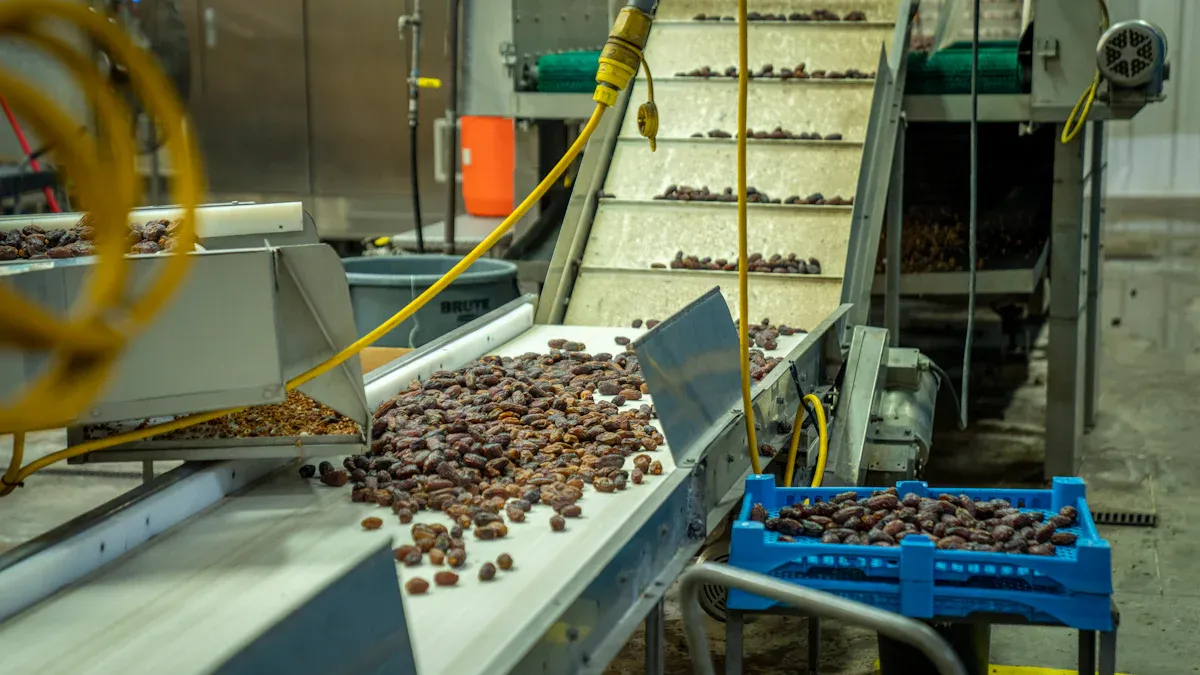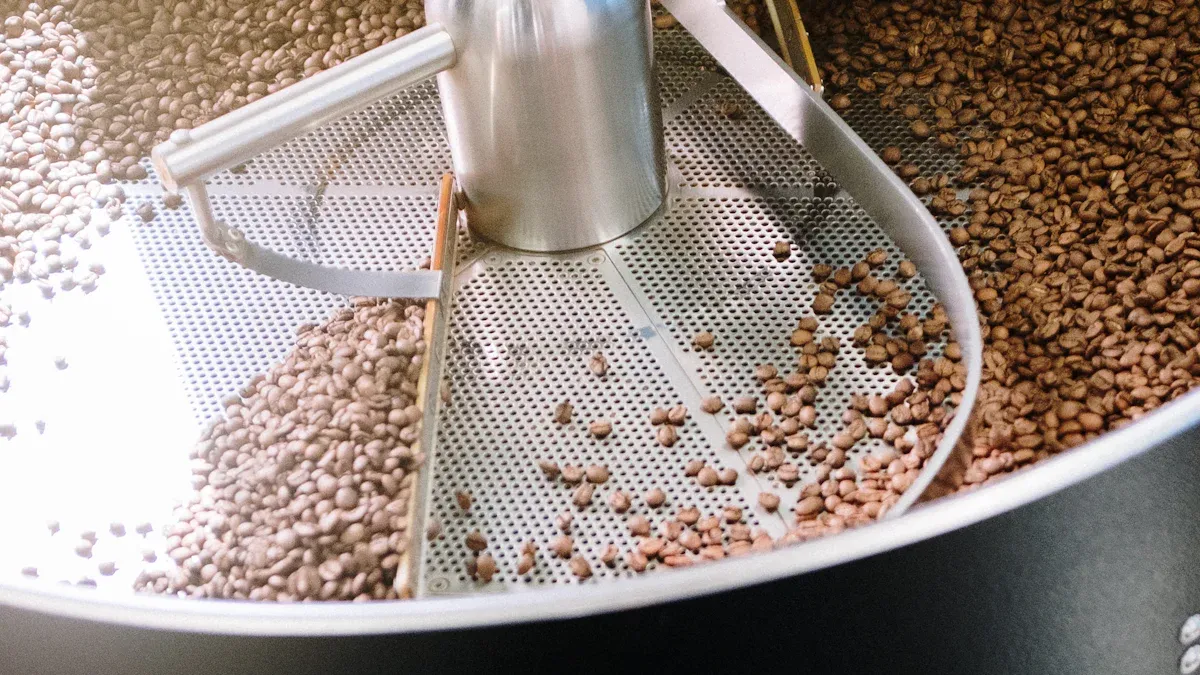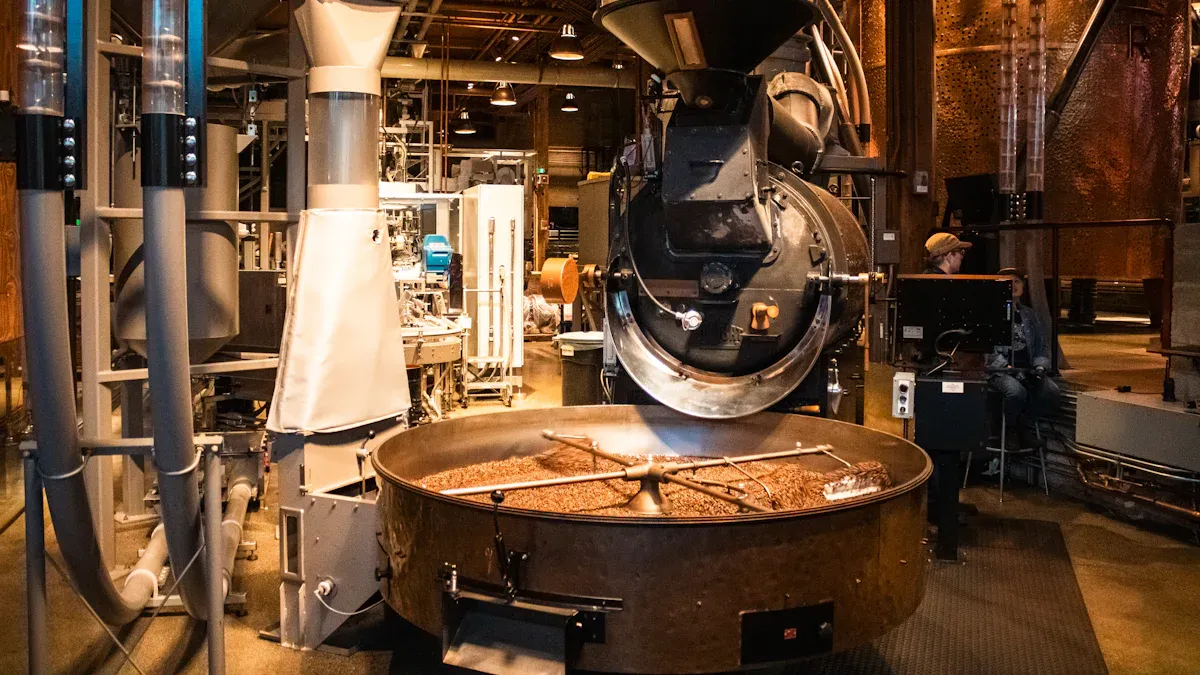
Selecting the right ODM Coffee Machine Factory plays a crucial role in ensuring the success of bulk orders. A dependable factory guarantees consistent quality, timely delivery, and adherence to industry standards. The significance of this choice becomes evident when considering the scale of the global coffee machine market. For instance:
- In 2020, China exported over 41 million dissolving drip coffee machines, accounting for nearly 45% of global exports.
- Coffee machine imports in China surged by 45.3% year-on-year, reaching USD 0.93 billion.
- Total exports of coffee machines from China hit USD 1.939 billion, reflecting a 3.7% growth from the previous year.
These figures highlight the demand for reliable manufacturers. Businesses must evaluate factory reliability, ensure product quality, and consider pricing structures to meet market expectations effectively.
Key Takeaways
- Pick an ODM factory for creative coffee machines. They design and make products, saving you money and time.
- Check if the factory is reliable by looking at reviews and certifications. This ensures good quality and follows industry rules.
- Ask for samples before ordering in bulk. Testing them ensures they are good and fit your needs.
- Learn about prices and minimum order amounts. This helps you get better deals and plan your budget well.
- Focus on clear communication with factories. Good communication builds trust and makes working together easier.
Understanding ODM Coffee Machine Factories
What is an ODM coffee machine factory?
An ODM coffee machine factory specializes in designing and manufacturing coffee machines from scratch. Unlike OEM (Original Equipment Manufacturer) factories, which focus solely on production based on external designs, ODM factories take full responsibility for both product design and manufacturing. This dual role allows businesses to access innovative, ready-to-market products without investing in their own design teams.
The table below highlights key differences between ODM and OEM manufacturing models:
| Feature | ODM (Original Design Manufacturer) | OEM (Original Equipment Manufacturer) |
|---|---|---|
| Design Responsibility | Designs products from scratch | Designs products but outsources manufacturing |
| Manufacturing Control | Controls both design and production | Focuses on manufacturing based on provided designs |
| Product Ownership | Intellectual property remains with the ODM | Intellectual property belongs to the company that designed the product |
For businesses seeking to launch or expand their coffee machine offerings, partnering with an ODM coffee machine factory provides a streamlined solution. It ensures access to high-quality, innovative products while reducing the complexities of product development.
Why reliability is critical for bulk orders
Reliability is a cornerstone when selecting an ODM coffee machine factory for bulk orders. A reliable factory ensures consistent product quality, timely delivery, and adherence to agreed specifications. These factors are crucial for maintaining customer satisfaction and meeting market demands.
Unreliable factories may cause delays, produce defective products, or fail to meet compliance standards. Such issues can disrupt supply chains, damage brand reputation, and lead to financial losses. Therefore, businesses must prioritize reliability to safeguard their operations and uphold their brand image.
Common risks of unreliable factories
Partnering with an unreliable ODM coffee machine factory poses several risks. These include:
- Inconsistent Quality: Products may fail to meet the required standards, leading to customer dissatisfaction.
- Missed Deadlines: Delayed deliveries can disrupt supply chains and harm business relationships.
- Non-Compliance: Factories that do not adhere to industry standards may produce non-compliant products, resulting in legal and financial repercussions.
- Lack of Transparency: Poor communication and hidden costs can strain partnerships and increase operational risks.
To mitigate these risks, businesses should conduct thorough evaluations of potential factories. This includes reviewing certifications, client feedback, and production capabilities before committing to bulk orders.
Evaluating the Reliability of an ODM Coffee Machine Factory
Certifications and compliance with industry standards
Certifications and compliance with industry standards serve as critical indicators of a factory’s reliability. A trustworthy ODM Coffee Machine Factory adheres to recognized certifications such as ISO 9001 for quality management systems or CE marking for products sold in the European Economic Area. These certifications demonstrate the factory’s commitment to maintaining consistent quality and meeting regulatory requirements.
Factories that comply with industry standards also ensure their products meet safety and performance benchmarks. For example, coffee machines must adhere to electrical safety standards to prevent hazards during operation. Businesses should request documentation of certifications and verify their authenticity through relevant regulatory bodies. This step minimizes risks associated with non-compliant products and ensures a smooth entry into target markets.
Experience and expertise in the coffee machine industry
Experience plays a pivotal role in determining the reliability of an ODM Coffee Machine Factory. Factories with extensive experience in the coffee machine industry possess a deeper understanding of market trends, customer preferences, and technical challenges. This expertise enables them to design and manufacture products that align with industry demands.
Factories with a proven track record often showcase their portfolio of successful projects. Reviewing this portfolio provides insights into their capabilities and the range of products they can deliver. Additionally, experienced factories are more likely to have established processes for quality control, ensuring consistent output. Businesses should prioritize factories with at least a decade of experience to benefit from their accumulated knowledge and refined production techniques.
Reputation and client reviews
A factory’s reputation reflects its reliability and performance. Positive client reviews and testimonials indicate a history of successful partnerships and satisfied customers. Businesses should research online platforms, industry forums, and social media to gather feedback about potential factories. Reviews often highlight key aspects such as product quality, delivery timelines, and customer service.
Direct communication with previous clients can provide deeper insights into the factory’s strengths and weaknesses. Asking about their experiences with bulk orders, customization options, and issue resolution helps assess the factory’s reliability. Factories with a strong reputation are more likely to prioritize customer satisfaction and maintain long-term partnerships.
Tip: Look for factories that actively engage with their clients and address concerns promptly. This proactive approach demonstrates their commitment to building trust and delivering value.
Ensuring Product Quality and Customization

Importance of high-quality components
High-quality components form the backbone of a reliable coffee machine. They ensure consistent performance, durability, and customer satisfaction. In the context of coffee machines, precision and material quality directly influence the brewing process and the final flavor of the coffee. For instance:
- Espresso machines with superior components consistently deliver balanced shots of espresso.
- High-performing steam wands produce microfoam essential for crafting lattes and cappuccinos.
- The brewing process, often compared to a science experiment, requires precision to achieve optimal flavor.
The materials used in coffee machines also play a critical role. Components made from stainless steel or high-grade plastics enhance durability and safety. These materials resist wear and tear, ensuring the machine operates efficiently over time. Businesses should prioritize factories that use premium materials and conduct rigorous testing to guarantee product reliability.
Customization options for branding and functionality
Customization is a key factor when selecting an ODM Coffee Machine Factory. It allows businesses to align the product with their brand identity and meet specific customer needs. Factories offering extensive customization options enable businesses to differentiate their products in a competitive market.
Branding customization includes logo placement, color schemes, and packaging design. These elements help create a cohesive brand image and improve product recognition. Functional customization, on the other hand, focuses on enhancing the machine’s features. Examples include adjustable grinder settings, programmable brewing options, and self-cleaning mechanisms.
By offering tailored solutions, factories empower businesses to cater to diverse customer preferences. This flexibility not only boosts customer satisfaction but also strengthens brand loyalty. Companies should collaborate closely with factories to explore available customization options and ensure the final product aligns with their vision.
Requesting samples and prototypes
Requesting samples and prototypes is a crucial step in ensuring product quality and customization. Samples allow businesses to evaluate the machine’s performance, design, and functionality before committing to bulk orders. Prototypes, on the other hand, provide a preview of customized features and branding elements.
During the evaluation process, businesses should test the machine’s brewing capabilities, durability, and ease of use. They should also assess whether the customized features meet their expectations. For example, testing programmable settings or adjustable grinders can reveal the machine’s adaptability to different user preferences.
Factories that provide samples and prototypes demonstrate their commitment to transparency and customer satisfaction. This practice minimizes risks associated with bulk production and ensures the final product meets quality standards. Businesses should prioritize factories that offer this service as part of their quality assurance process.
Pricing, Order Quantities, and Payment Terms
Comparing pricing structures
Understanding pricing structures is essential when selecting an ODM coffee machine factory. Factories often base their pricing on factors such as production volume, material quality, and customization requirements. Businesses should compare these structures to identify the most cost-effective option without compromising quality.
Market research reports, such as the Global Self-service Shared Coffee Machines Market Research Report 2025, provide valuable insights into pricing trends. These reports analyze global pricing data and market shares, helping businesses make informed decisions. For example:
| Category | Description |
|---|---|
| Report Title | Global Self-service Shared Coffee Machines Market Research Report 2025 |
| Key Insights | Includes pricing information and market share data for ODM factories |
| Data Range | Consumption and growth rates from 2020 to 2031 across various regions |
| Pricing Data | Global Self-service Shared Coffee Machines Price (US$/Unit) by Type and Application (2020-2031) |
By leveraging such data, businesses can benchmark factory pricing against industry standards and negotiate better deals.
Minimum order quantities and their implications
Minimum order quantities (MOQs) significantly impact production costs and delivery timelines. Factories often set MOQs to optimize manufacturing efficiency and reduce per-unit costs. However, businesses must assess whether the MOQ aligns with their budget and inventory needs.
For instance, a factory producing double-group espresso machines with a 12L primary boiler may require a minimum order of 10 units, with a delivery time of 10 days:
| Product Description | Minimum Order Quantity | Delivery Time |
|---|---|---|
| Double Group Espresso Machine 9 Bar Pressure 12L Primary Boiler | 10 pcs | 10 days |
Smaller businesses should carefully evaluate MOQs to avoid overstocking or straining their resources. Factories offering flexible MOQs can better accommodate varying business sizes and order requirements.
Negotiating payment terms
Payment terms play a crucial role in managing cash flow during bulk orders. Reliable factories often provide flexible terms, such as partial payments upfront and the balance upon delivery. Businesses should negotiate terms that minimize financial strain while ensuring timely payments.
Clear communication about payment schedules, accepted currencies, and transaction methods fosters trust between both parties. Factories that offer transparent and accommodating payment policies demonstrate their commitment to long-term partnerships. Businesses should prioritize factories willing to collaborate on terms that align with their financial strategies.
Communication and Customer Service
Responsiveness and clarity in communication
Effective communication forms the backbone of a successful partnership with an ODM coffee machine factory. Factories that respond promptly and provide clear information foster trust and streamline operations. Businesses should assess communication effectiveness using established metrics, such as Net Promoter Score (NPS), Customer Satisfaction (CSAT), and Customer Effort Score (CES).
| Metric | Description |
|---|---|
| Net Promoter Score (NPS) | Measures customer loyalty by asking how likely they are to recommend the business to others. |
| Customer Satisfaction (CSAT) | Assesses customer satisfaction based on their recent experience with a product or service. |
| Customer Effort Score (CES) | Evaluates how easy it is for customers to interact with the brand, focusing on minimizing effort. |
Factories with high scores on these metrics demonstrate their commitment to customer-centric communication. Businesses should prioritize partners who provide timely updates, detailed responses, and proactive solutions to inquiries. This approach reduces misunderstandings and ensures smooth collaboration during bulk orders.
Tip: Choose factories that offer multilingual support to overcome language barriers and enhance clarity in communication.
Availability of after-sales support
After-sales support plays a pivotal role in maintaining product performance and customer satisfaction. Reliable factories offer comprehensive support services, including troubleshooting, spare parts availability, and warranty coverage. These services ensure that businesses can address issues promptly and minimize downtime.
Factories with dedicated support teams often provide user manuals, video tutorials, and live assistance to guide customers through technical challenges. Businesses should inquire about the scope of after-sales services and evaluate their responsiveness to customer concerns. A factory’s ability to resolve issues efficiently reflects its commitment to long-term customer success.
Note: Factories that offer extended warranties and maintenance packages add value to their products and strengthen customer trust.
Building long-term partnerships
Establishing a long-term partnership with an ODM coffee machine factory benefits both parties. Reliable factories prioritize relationship-building by delivering consistent quality, meeting deadlines, and adapting to evolving business needs. These efforts foster mutual growth and stability.
Businesses should focus on factories that demonstrate flexibility in customization, transparent pricing, and proactive communication. Regular collaboration on product development and market strategies strengthens the partnership over time. Factories that invest in understanding their clients’ goals and challenges create a foundation for sustained success.
Callout: Long-term partnerships reduce operational risks and enhance supply chain efficiency, making them a strategic asset for businesses.
Conducting Factory Visits or Audits

Benefits of visiting the factory
Visiting the factory provides businesses with a firsthand understanding of the production process. It allows them to evaluate the factory’s capabilities, quality control measures, and adherence to promised standards. Observing operations in person helps identify potential issues that may not be apparent through remote communication.
A factory visit also fosters stronger relationships between businesses and manufacturers. Face-to-face interactions build trust and encourage open communication. Additionally, businesses can verify the factory’s certifications, inspect equipment, and assess the working environment. These insights ensure that the factory aligns with their expectations and requirements for bulk orders.
Tip: Schedule visits during active production periods to observe real-time operations and identify any inconsistencies.
Key areas to inspect during a visit
During a factory visit, businesses should focus on critical areas that impact product quality and reliability. A comprehensive inspection checklist ensures no aspect is overlooked. Key areas to evaluate include:
- Packaging & Packing Inspection: Assess the durability and presentation of packaging materials.
- Structure & Materials Inspection: Verify the quality of raw materials and structural components.
- Workmanship: Examine the precision and consistency of assembly processes.
- On-site Test: Observe testing procedures for functionality and safety.
- Assembly Check: Ensure proper alignment and integration of machine parts.
- Function Check: Confirm that machines operate as intended.
- Fatigue Test: Evaluate the machine’s performance under prolonged use.
- Rub Check: Inspect for wear and tear on frequently used components.
- Tape Check: Test the adhesion strength of labels and seals.
- Stability Test: Assess the machine’s balance and sturdiness.
- Running Test: Monitor the machine’s performance during continuous operation.
- Carton Drop Test: Verify the packaging’s ability to protect the product during transit.
These inspections provide a clear picture of the factory’s quality control standards and production reliability.
Alternatives to in-person visits
When visiting the factory is not feasible, businesses can explore alternative methods to assess the manufacturer’s capabilities. Virtual factory tours, facilitated through video conferencing, offer a practical solution. Manufacturers can showcase their facilities, production lines, and testing processes in real time.
Third-party audits conducted by professional inspection agencies provide another reliable option. These agencies perform detailed evaluations based on industry standards and share comprehensive reports. Businesses can also request video demonstrations of specific production stages or testing procedures.
Note: Ensure that virtual tours or third-party audits cover all critical areas, including quality control measures and compliance certifications, to make informed decisions.
Choosing a reliable ODM Coffee Machine Factory involves several critical steps. Businesses should hire sourcing agents to identify reputable manufacturers, verify their credentials through reviews and official records, and request references to confirm credibility. Conducting due diligence ensures consistent quality and minimizes risks. Companies should also take actionable steps, such as requesting product samples or scheduling factory audits, to evaluate performance and reliability. These measures help build trust and ensure long-term success in bulk orders.
FAQ
1. What is the difference between ODM and OEM coffee machine factories?
ODM factories handle both product design and manufacturing, offering ready-to-market solutions. OEM factories focus solely on production based on external designs. Businesses seeking innovative, pre-designed products often prefer ODM factories, while OEM factories suit those with proprietary designs.
Tip: Choose an ODM factory for faster market entry and reduced design costs.
2. How can businesses verify a factory’s certifications?
Businesses should request documentation of certifications like ISO 9001 or CE marking. Verification can be done through official regulatory bodies or third-party auditors. Authentic certifications ensure compliance with industry standards and product safety.
Note: Always cross-check certifications to avoid risks associated with non-compliant products.
3. Why are factory visits important before placing bulk orders?
Factory visits provide firsthand insights into production processes, quality control measures, and operational standards. Observing real-time operations helps identify potential issues and ensures the factory meets expectations.
Callout: If visiting in person is not feasible, consider virtual tours or third-party audits.
4. What should businesses prioritize when evaluating customization options?
Businesses should focus on branding elements like logos and packaging, as well as functional features such as programmable settings or grinder adjustments. Customization enhances product differentiation and customer satisfaction.
Emoji: ✨ Customization adds value and strengthens brand identity.
5. How can businesses ensure effective communication with factories?
Businesses should assess the factory’s responsiveness, clarity, and language support. Metrics like Net Promoter Score (NPS) or Customer Satisfaction (CSAT) can help evaluate communication effectiveness.
Tip: Factories offering multilingual support reduce misunderstandings and improve collaboration.
Post time: Apr-15-2025
